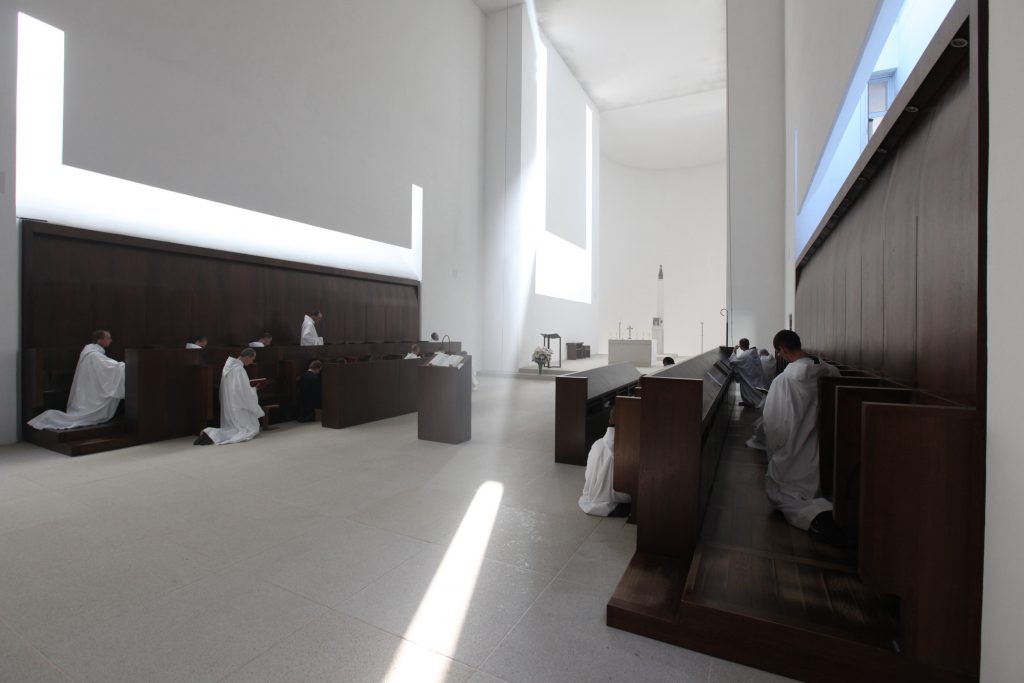Personal prayer and reading

Can we maintain an amicable relationship without devoting time to it? Monks therefore organise their days, dedicating long periods to prayer before the Holy Sacrament, each to their own rhythm since this is a personal activity.
“Yet the news about him spread all the more, so that crowds of people came to hear him and to be healed of their sicknesses. But Jesus often withdrew to lonely places and prayed”
(Gospel of Luke, 5:15-16)

From our elders, we have learned to spend long periods occupied simply by vocal prayer, invocations or reading, in an attitude of faith. There is a way of remaining attentive to the Lord’s presence that each person must discover according to their individual grace, guided by an elder.
The personal prayer of monks, like that of any fervent Christian who regularly devotes time to being with Lord Jesus, is most often founded on an act of faith in which feelings play no part. They believe that by giving time to God, God will reveal Himself to them. Engaged in private prayer, monks look at the Tabernacle or use a book to sustain their attention, from which they read a few pages, with silent pauses, and a short prayer murmured from time to time. This is the prayer of the poor, a humble prayer that is pleasing to God.
“Let nothing or nobody occupy your heart, except for God”,
wrote Saint Théophane of Tambov.
Throughout the day, even when working, monks learn to counter their temptations, faults or emotions – or the time they waste on futilities – with an invocation or short prayer.
“And will not God bring about justice for his chosen ones, who cry out to him day and night? Will he keep putting them off?”
(Gospel of Luke 18:7)
The Lectio Divina is a sort of unhurried reading, engaging a person in full and helping them relate to God. The reading takes place in an atmosphere of contemplation, interwoven with prayer, with no intention of amassing information on a range of different subjects. It is guided reading, with a view to communion with God. It involves consent rather than reflection.
“From infancy you have known the Holy Scriptures, which are able to make you wise for salvation through faith in Christ Jesus. All Scripture is God-breathed and is useful for teaching, rebuking, correcting and training in righteousness, so that the servant of God may be thoroughly equipped for every good work.”
(Second letter to Timothy 3:15-17)
In early centuries, monks only read the Bible or recited it by heart. In the age of Saint Benedict, the Fathers of the Church had a place in the Lectio Divina. It is only in modern times that we have distinguished Lectio Divina and “spiritual reading”. These days, monks’ reading covers a very wide register: the Word of God and everything that enables them to hear it truthfully, as well as everything that helps them acquire human and spiritual experience with a view to being as one with God.
Reading entrenches the convictions of monks, fuels their intellect and strengthens their resolve. It enriches their human experience, consolidates their characters with their vocation, nourishes their faith and fills their imagination with images and experiences that support their journey towards God. Year after year, monks acquire a solid culture that guides them in their search for God.
Although Our Lord Jesus occupies the central place, the Virgin Mary is at the heart of a monk’s life. She is a motherly presence, strengthened by intercessory power and a comfort for many worries, trials and tribulations. She is an exemplary model, being the first to accept an unexpected vocation. She lives with her son and leads us to Him.
“Do not be afraid, Mary; you have found favour with God. You will conceive and give birth to a son, and you are to call him Jesus.”
(Gospel of Luke 1:30-31)